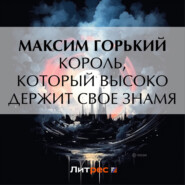По всем вопросам обращайтесь на: info@litportal.ru
(©) 2003-2024.
✖
The Man Who Was Afraid
Настройки чтения
Размер шрифта
Высота строк
Поля
Foma burst into laughter. He did not feel like going to the table, where three happy people were engaged in a lively conversation. He heard their merry voices, their contented laughter, the rattle of the dishes, and he understood that, with that burden on his heart, there was no place for him beside them. Nor was there a place for him anywhere. If all people only hated him, even as Lubov hated him now, he would feel more at ease in their midst, he thought. Then he would know how to behave with them, would find something to say to them. While now he could not understand whether they were pitying him or whether they were laughing at him, because he had lost his way and could not conform himself to anything. As he stood awhile alone in the middle of the room, he unconsciously resolved to leave this house where people were rejoicing and where he was superfluous. On reaching the street, he felt himself offended by the Mayakins. After all, they were the only people near to him in the world. Before him arose his godfather’s face, on which the wrinkles quivered with agitation, and illuminated by the merry glitter of his green eyes, seemed to beam with phosphoric light.
“Even a rotten trunk of a tree stands out in the dark!” reflected Foma, savagely. Then he recalled the calm and serious face of Taras and beside it the figure of Lubov bowing herself hastily toward him. That aroused in him feelings of envy and sorrow.
“Who will look at me like that? There is not a soul to do it.”
He came to himself from his broodings on the shore, at the landing-places, aroused by the bustle of toil. All sorts of articles and wares were carried and carted in every direction; people moved about hastily, care-worn, spurring on their horses excitedly, shouting at one another, filling the street with unintelligible bustle and deafening noise of hurried work. They busied themselves on a narrow strip of ground, paved with stone, built up on one side with tall houses, and the other side cut off by a steep ravine at the river, and their seething bustle made upon Foma an impression as though they had all prepared themselves to flee from this toil amid filth and narrowness and tumult – prepared themselves to flee and were now hastening to complete the sooner the unfinished work which would not release them. Huge steamers, standing by the shore and emitting columns of smoke from their funnels, were already awaiting them. The troubled water of the river, closely obstructed with vessels, was softly and plaintively splashing against the shore, as though imploring for a minute of rest and repose.
“Your Honour!” a hoarse cry rang out near Foma’s ears, “contribute some brandy in honour of the building!”
Foma glanced at the petitioner indifferently; he was a huge, bearded fellow, barefooted, with a torn shirt and a bruised, swollen face.
“Get away!” muttered Foma, and turned away from him.
“Merchant! When you die you can’t take your money with you. Give me for one glass of brandy, or are you too lazy to put your hand into your pocket?”
Foma again looked at the petitioner; the latter stood before him, covered more with mud than with clothes, and, trembling with intoxication, waited obstinately, staring at Foma with blood-shot, swollen eyes.
“Is that the way to ask?” inquired Foma.
“How else? Would you want me to go down on my knees before you for a ten-copeck piece?” asked the bare-footed man, boldly.
“There!” and Foma gave him a coin.
“Thanks! Fifteen copecks. Thanks! And if you give me fifteen more I’ll crawl on all fours right up to that tavern. Do you want me to?” proposed the barefooted man.
“Go, leave me alone!” said Foma, waving him off with his hand.
“He who gives not when he may, when he fain would, shall have nay,” said the barefooted man, and stepped aside.
Foma looked at him as he departed, and said to himself:
“There is a ruined man and yet how bold he is. He asks alms as though demanding a debt. Where do such people get so much boldness?”
And heaving a deep sigh, he answered himself:
“From freedom. The man is not fettered. What is there that he should regret? What does he fear? And what do I fear? What is there that I should regret?”
These two questions seemed to strike Foma’s heart and called forth in him a dull perplexity. He looked at the movement of the working people and kept on thinking: What did he regret? What did he fear?
“Alone, with my own strength, I shall evidently never come out anywhere. Like a fool I shall keep on tramping about among people, mocked and offended by all. If they would only jostle me aside; if they would only hate me, then – then – I would go out into the wide world! Whether I liked or not, I would have to go!”
From one of the landing wharves the merry “dubinushka” [“Dubinushka,” or the “Oaken Cudgel,” is a song popular with the Russian workmen.] had already been smiting the air for a long time. The carriers were doing a certain work, which required brisk movements, and were adapting the song and the refrain to them.
“In the tavern sit great merchants
Drinking liquors strong,”
narrated the leader, in a bold recitative. The company joined in unison:
“Oh, dubinushka, heave-ho!”
And then the bassos smote the air with deep sounds:
“It goes, it goes.”
And the tenors repeated:
“It goes, it goes.”
Foma listened to the song and directed his footsteps toward it, on the wharf. There he noticed that the carriers, formed in two rows, were rolling out of the steamer’s hold huge barrels of salted fish. Dirty, clad in red blouses, unfastened at the collar, with mittens on their hands, with arms bare to the elbow, they stood over the hold, and, merrily jesting, with faces animated by toil, they pulled the ropes, all together, keeping time to their song. And from the hold rang out the high, laughing voice of the invisible leader:
“But for our peasant
There is not enough vodka.”
And the company, like one huge pair of lungs, heaved forth loudly and in unison:
“Oh, dubinushka, heave-ho!”
Foma felt pleased and envious as he looked at this work, which was as harmonious as music. The slovenly faces of the carriers beamed with smiles, the work was easy, it went on smoothly, and the leader of the chorus was in his best vein. Foma thought that it would be fine to work thus in unison, with good comrades, to the tune of a cheerful song, to get tired from work to drink a glass of vodka and eat fat cabbage soup, prepared by the stout, sprightly matron of the company.
“Quicker, boys, quicker!” rang out beside him someone’s unpleasant, hoarse voice.
Foma turned around. A stout man, with an enormous paunch, tapped on the boards of the landing bridge with his cane, as he looked at the carriers with his small eyes and said:
“Bawl less and work faster.”
His face and neck were covered with perspiration; he wiped it off every now and then with his left hand and breathed heavily, as though he were going uphill.
Foma cast at the man a hostile look and thought:
“Others are working and he is sweating. And I am still worse than he. I’m like a crow on the fence, good for nothing.”
From each and every impression there immediately stood out in his mind the painful thought of his unfitness for life. Everything that attracted his attention contained something offensive to him, and this something fell like a brick upon his breast. At one side of him, by the freight scales, stood two sailors, and one of them, a square-built, red-faced fellow, was telling the other:
“As they rushed on me it began for fair, my dear chap! There were four of them – I was alone! But I didn’t give in to them, because I saw that they would beat me to death! Even a ram will kick out if you fleece it alive. How I tore myself away from them! They all rolled away in different directions.”
“But you came in for a sound drubbing all the same?” inquired the other sailor.
“Of course! I caught it. I swallowed about five blows. But what’s the difference? They didn’t kill me. Well, thank God for it!”
“Certainly.”
“To the stern, devils, to the stern, I’m telling you!” roared the perspiring man in a ferocious voice at two carriers who were rolling a barrel of fish along the deck.
“What are you yelling for?” Foma turned to him sternly, as he had started at the shout.
“Is that any of your business?” asked the perspiring man, casting a glance at Foma.
“It is my business! The people are working and your fat is melting away. So you think you must yell at them?” said Foma, threateningly, moving closer toward him.
“Even a rotten trunk of a tree stands out in the dark!” reflected Foma, savagely. Then he recalled the calm and serious face of Taras and beside it the figure of Lubov bowing herself hastily toward him. That aroused in him feelings of envy and sorrow.
“Who will look at me like that? There is not a soul to do it.”
He came to himself from his broodings on the shore, at the landing-places, aroused by the bustle of toil. All sorts of articles and wares were carried and carted in every direction; people moved about hastily, care-worn, spurring on their horses excitedly, shouting at one another, filling the street with unintelligible bustle and deafening noise of hurried work. They busied themselves on a narrow strip of ground, paved with stone, built up on one side with tall houses, and the other side cut off by a steep ravine at the river, and their seething bustle made upon Foma an impression as though they had all prepared themselves to flee from this toil amid filth and narrowness and tumult – prepared themselves to flee and were now hastening to complete the sooner the unfinished work which would not release them. Huge steamers, standing by the shore and emitting columns of smoke from their funnels, were already awaiting them. The troubled water of the river, closely obstructed with vessels, was softly and plaintively splashing against the shore, as though imploring for a minute of rest and repose.
“Your Honour!” a hoarse cry rang out near Foma’s ears, “contribute some brandy in honour of the building!”
Foma glanced at the petitioner indifferently; he was a huge, bearded fellow, barefooted, with a torn shirt and a bruised, swollen face.
“Get away!” muttered Foma, and turned away from him.
“Merchant! When you die you can’t take your money with you. Give me for one glass of brandy, or are you too lazy to put your hand into your pocket?”
Foma again looked at the petitioner; the latter stood before him, covered more with mud than with clothes, and, trembling with intoxication, waited obstinately, staring at Foma with blood-shot, swollen eyes.
“Is that the way to ask?” inquired Foma.
“How else? Would you want me to go down on my knees before you for a ten-copeck piece?” asked the bare-footed man, boldly.
“There!” and Foma gave him a coin.
“Thanks! Fifteen copecks. Thanks! And if you give me fifteen more I’ll crawl on all fours right up to that tavern. Do you want me to?” proposed the barefooted man.
“Go, leave me alone!” said Foma, waving him off with his hand.
“He who gives not when he may, when he fain would, shall have nay,” said the barefooted man, and stepped aside.
Foma looked at him as he departed, and said to himself:
“There is a ruined man and yet how bold he is. He asks alms as though demanding a debt. Where do such people get so much boldness?”
And heaving a deep sigh, he answered himself:
“From freedom. The man is not fettered. What is there that he should regret? What does he fear? And what do I fear? What is there that I should regret?”
These two questions seemed to strike Foma’s heart and called forth in him a dull perplexity. He looked at the movement of the working people and kept on thinking: What did he regret? What did he fear?
“Alone, with my own strength, I shall evidently never come out anywhere. Like a fool I shall keep on tramping about among people, mocked and offended by all. If they would only jostle me aside; if they would only hate me, then – then – I would go out into the wide world! Whether I liked or not, I would have to go!”
From one of the landing wharves the merry “dubinushka” [“Dubinushka,” or the “Oaken Cudgel,” is a song popular with the Russian workmen.] had already been smiting the air for a long time. The carriers were doing a certain work, which required brisk movements, and were adapting the song and the refrain to them.
“In the tavern sit great merchants
Drinking liquors strong,”
narrated the leader, in a bold recitative. The company joined in unison:
“Oh, dubinushka, heave-ho!”
And then the bassos smote the air with deep sounds:
“It goes, it goes.”
And the tenors repeated:
“It goes, it goes.”
Foma listened to the song and directed his footsteps toward it, on the wharf. There he noticed that the carriers, formed in two rows, were rolling out of the steamer’s hold huge barrels of salted fish. Dirty, clad in red blouses, unfastened at the collar, with mittens on their hands, with arms bare to the elbow, they stood over the hold, and, merrily jesting, with faces animated by toil, they pulled the ropes, all together, keeping time to their song. And from the hold rang out the high, laughing voice of the invisible leader:
“But for our peasant
There is not enough vodka.”
And the company, like one huge pair of lungs, heaved forth loudly and in unison:
“Oh, dubinushka, heave-ho!”
Foma felt pleased and envious as he looked at this work, which was as harmonious as music. The slovenly faces of the carriers beamed with smiles, the work was easy, it went on smoothly, and the leader of the chorus was in his best vein. Foma thought that it would be fine to work thus in unison, with good comrades, to the tune of a cheerful song, to get tired from work to drink a glass of vodka and eat fat cabbage soup, prepared by the stout, sprightly matron of the company.
“Quicker, boys, quicker!” rang out beside him someone’s unpleasant, hoarse voice.
Foma turned around. A stout man, with an enormous paunch, tapped on the boards of the landing bridge with his cane, as he looked at the carriers with his small eyes and said:
“Bawl less and work faster.”
His face and neck were covered with perspiration; he wiped it off every now and then with his left hand and breathed heavily, as though he were going uphill.
Foma cast at the man a hostile look and thought:
“Others are working and he is sweating. And I am still worse than he. I’m like a crow on the fence, good for nothing.”
From each and every impression there immediately stood out in his mind the painful thought of his unfitness for life. Everything that attracted his attention contained something offensive to him, and this something fell like a brick upon his breast. At one side of him, by the freight scales, stood two sailors, and one of them, a square-built, red-faced fellow, was telling the other:
“As they rushed on me it began for fair, my dear chap! There were four of them – I was alone! But I didn’t give in to them, because I saw that they would beat me to death! Even a ram will kick out if you fleece it alive. How I tore myself away from them! They all rolled away in different directions.”
“But you came in for a sound drubbing all the same?” inquired the other sailor.
“Of course! I caught it. I swallowed about five blows. But what’s the difference? They didn’t kill me. Well, thank God for it!”
“Certainly.”
“To the stern, devils, to the stern, I’m telling you!” roared the perspiring man in a ferocious voice at two carriers who were rolling a barrel of fish along the deck.
“What are you yelling for?” Foma turned to him sternly, as he had started at the shout.
“Is that any of your business?” asked the perspiring man, casting a glance at Foma.
“It is my business! The people are working and your fat is melting away. So you think you must yell at them?” said Foma, threateningly, moving closer toward him.

















